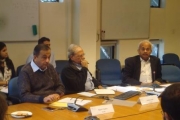NCAER organised a conversation with Shanta Devarajan, Senior Director for Development Economics at the World Bank in Washington DC and Non-resident Senior Fellow, on what to do when markets and governments fail poor people in delivering services in health, education, infrastructure, the environment, and the rule of law. This talk by Devarajan’s at NCAER was built on an earlier July 2017 discussion of these issues at the NCAER 2017 India Policy Forum in which Devarajan was also a panellist, along with Member of Parliament B J Panda and Karthik Muralidharan of the UC, San Diego, moderated by Pranab Bardhan of the UC, Berkeley. A video of the session is available here.
In many areas of public policy, governments carve out a role for themselves in effect to overcome what are perceived as widespread market failures. Examples abound across the world of governments intervening to correct negative externalities where there is a wedge between public purpose and private interest, and the outcomes are bad, particularly for poor people with the least means to cope with poor service delivery. In India, governments often turn to command and control approaches to solving serious problems of public policy, for example air quality, essentially because of a deep distrust of more market-based approaches. Governments routinely intervene in pricing, usually on the grounds of helping the poor.
But in doing so, governments often themselves fall prey to government failure, because they do not have the capacity to implement, or they get captured, or they create vested interests (“the only thing worse than a private monopoly is a public monopoly”) and corruption, or a subsidy in one part of the economy does widespread and worse damage in another part of the economy. Delhi’s air quality is a constant reminder of what happens when government failure meets market failure. And yet, governments are essential to any well-functioning economy that both provides opportunity and protects the vulnerable. In his very stimulating talk at NCAER, Devarajan concentrated on what to do in the face of both market and government failures to make services work for poor people.
Shantayanan Devarajan is the Senior Director for Development Economics at the World Bank. He joined the Bank in 1991 as a Principal Economist and then Research Manager for Public Economics in the Bank’s Development Research Group. Over the past decade and a half, Devarajan has been the Bank’s Chief Economist for its Human Development Network, the South Asia Region, the Africa Region, and most recently the Middle East and North Africa Region. During 2002-03, he was the Staff Director of the 2004 World Development Report, Making Services Work for Poor People, one of the most widely cited WDRs in the Bank’s history. In his current role he heads and directs the Bank’s research complex. He was on the faculty of Harvard University’s Kennedy School of Government prior to 1991.
The author or co-author of over 100 publications, Devarajan’s research covers public economics, trade policy, natural resources and the environment, and general equilibrium modelling of developing countries. He received his BA in Mathematics from Princeton University and a PhD in Economics from the University of California, Berkeley.






